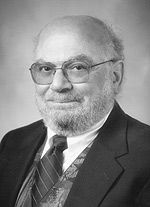Berkeleyan
Obituary
Leo Breiman
![]()
03 August 2005
 Leo Breiman |
Born in New York City in 1928, Breiman earned a degree in physics from the California Institute of Technology and, in 1950, a master's degree in mathematics from Columbia University. After earning his Ph.D. from Berkeley in 1954, he was hired to teach probability theory at UCLA. Some years later, realizing that he "wasn't cut out to be an abstract mathematician," he resigned from his tenured position, devoting the next six months to writing the very influential graduate textbook Probability Theory.
Breiman next spent years as a statistical consultant, developing and using new statistical methods to predict such matters as patterns of traffic on the freeways, bottlenecks in the court system, and next-day ozone levels in the Los Angeles basin. His interest in education led him to run for the Santa Monica School District board, where he ultimately served as president.
After joining the statistics faculty at Berkeley in 1980, he established the department's Statistical Computing Facility. At the time, the department had only a small computer with 32 kilobytes of main memory. Today, the department computer facility, with four full-time staff, is home to some 2,000 accounts a year. The SCF, as it is called, also supports computing in the biostatistics division of the School of Public Health and the econometrics lab in the Department of Economics.
Breiman retired in 1993 but, as a professor in the graduate school, continued to get substantial National Science Foundation grants and supervise Ph.D. students. During his career he was elected a member of the National Academy of Sciences and of the American Academy of Arts and Sciences.
He is survived by his wife, Mary Lou, of Berkeley, and daughters Rebekah and Jessie, both of Salt Lake City.
A campus memorial service will be held in the fall. Contributions in his memory may be sent, earmarked for the Leo Breiman Fund, to the Department of Statistics, UC Berkeley, 367 Evans Hall, Berkeley, CA 94720-3860. These contributions will fund a prize in applied statistics and, if sufficient, a graduate fellowship in that field.

